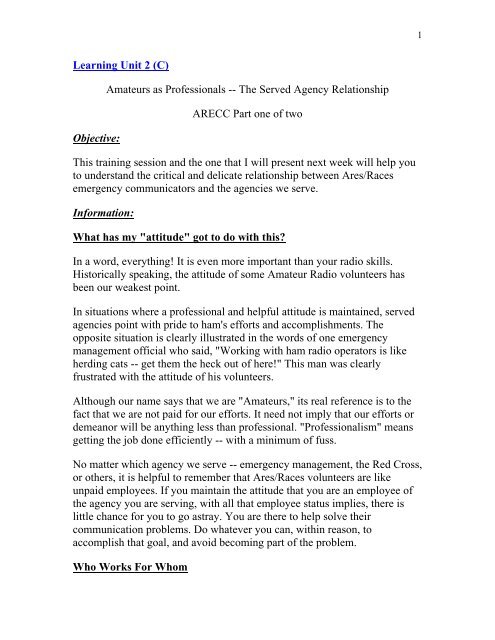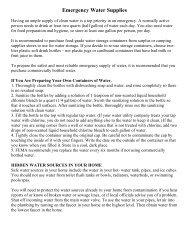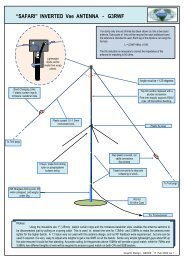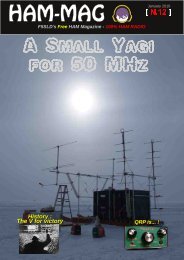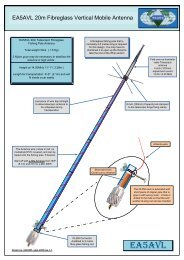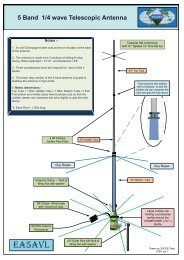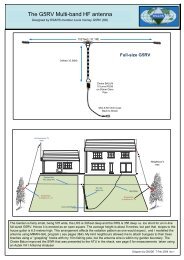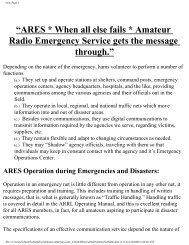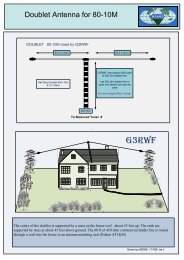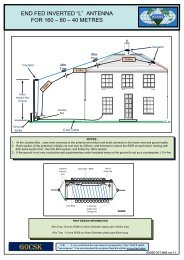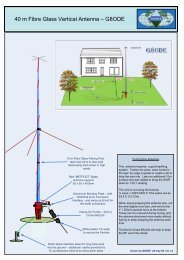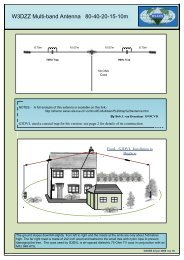Training Scripts/Learning Unit 2.pdf - arkansas ares races
Training Scripts/Learning Unit 2.pdf - arkansas ares races
Training Scripts/Learning Unit 2.pdf - arkansas ares races
Create successful ePaper yourself
Turn your PDF publications into a flip-book with our unique Google optimized e-Paper software.
1<strong>Learning</strong> <strong>Unit</strong> 2 (C)Objective:Amateurs as Professionals -- The Served Agency RelationshipARECC Part one of twoThis training session and the one that I will present next week will help youto understand the critical and delicate relationship between Ares/Racesemergency communicators and the agencies we serve.Information:What has my "attitude" got to do with this?In a word, everything! It is even more important than your radio skills.Historically speaking, the attitude of some Amateur Radio volunteers hasbeen our weakest point.In situations where a professional and helpful attitude is maintained, servedagencies point with pride to ham's efforts and accomplishments. Theopposite situation is clearly illustrated in the words of one emergencymanagement official who said, "Working with ham radio operators is likeherding cats -- get them the heck out of here!" This man was clearlyfrustrated with the attitude of his volunteers.Although our name says that we are "Amateurs," its real reference is to thefact that we are not paid for our efforts. It need not imply that our efforts ordemeanor will be anything less than professional. "Professionalism" meansgetting the job done efficiently -- with a minimum of fuss.No matter which agency we serve -- emergency management, the Red Cross,or others, it is helpful to remember that Ares/Races volunteers are likeunpaid employees. If you maintain the attitude that you are an employee ofthe agency you are serving, with all that employee status implies, there islittle chance for you to go astray. You are there to help solve theircommunication problems. Do whatever you can, within reason, toaccomplish that goal, and avoid becoming part of the problem.Who Works For Whom
2The relationship between the volunteer communicator and served agencywill vary somewhat from situation to situation, but the fact is that you workfor them. It doesn't matter whether you are part of a separate radio grouplike the Amateur Radio Emergency Service (ARES), or part of the agency'sregular volunteer force. You still work for them.Your job is to meet the communication needs of the served agency, Period.It is not to show off your fancy equipment, nor to impress anyone with yourknowledge of radio and electronics. A "know-it-all" or "I will show you howgood I am, and how inadequate you are" attitude will end your -- and our --relationship with the served agency in a hurry.It is often said that volunteers don't have to take orders. This is true -- we donot. However, when you volunteer your services to an organization, youimplicitly agree to accept and comply with reasonable orders and requestsfrom your "employer." If you do not feel comfortable doing this, do notvolunteer.There may be times that you find yourself unwilling or unable to complywith a served agency's demands. The reasons may be personal, or related tosafety or health, or it may be that you do not consider yourself qualified orcapable of meeting a particular demand. On rare occasions, it may be thatthey ask you to do something not permitted by FCC rules. Regardless of thereason, respectfully explain the situation, and work with the served agencyor your leadership in the communication group to come up with analternative solution. If the discussion with the served agency becomesdifficult or uncomfortable, you can always politely pass the discussion up toyour immediate Ares/Races leadership so that they can handle it instead.How Professional Emergency Responders Often View VolunteersUnless a positive and long established relationship exists betweenprofessionals and volunteers, professionals who do not work regularly withcompetent volunteers are likely to look at them as "less than useful." Thereare several reasons for this. Fire departments have a long history ofcompetitive relationships between professional and volunteer firefighters,and this attitude may carry over to volunteers in general. Police agencies areoften distrustful of outsiders -- often for legitimate information securityconcerns. Professionals in any field put a great deal of time and effort intotheir skills and training, and take considerable pride in their professional
3standing. As a result, they may view themselves as able to handle allpossible situations without outside assistance.Volunteers, on the other hand, are often viewed as "part timers" whose skilllevel and dedication to the job vary widely. Many agencies andorganizations have learned that some volunteers cannot be depended onwhen they are needed most. Do not be offended if this attitude is obvious,and remember that you cannot change it overnight. It takes time for you toprove yourselves, and for a positive working relationship to develop andmature.The middle of an on-going incident is not the time to try to change a "we donot need you" attitude. If your offer of assistance is refused, do not press theissue. The incident commander is busy with more pressing needs, and if hechanges his mind about your offer, he will probably contact you. Remember:the served agency's authority should never be challenged -- They are incharge, and you are not.Performing Non-Communication RolesIt has been said many times that our job should be strictly limited tocommunication. But is this a hard and fast rule? When you work as aSKYWARN weather spotter, or collect and relay damage reports for the RedCross, is this not going beyond your role as a communicator?Well, yes and no. The old model of the emergency communicator was onewhere a written message would be generated by the served agency andhanded to the radio operator. They would format and transmit the message toanother station, whose operator would then write it out and then deliver it tothe addressee. In this role, hams were strictly communicators, and due to theradio technology of the times, it was appropriate. Those days are goneforever.In today's fast paced emergency responses, there is often no time for this sortof system. Events are happening too quickly, and the agency'scommunications must move at the same speed. The job description willmore likely be "any function that also includes communication," as definedby the served agency. For this reason, emergency communication groupsshould engage in pre-planning with the served agency to ensure that thesejobs are clearly defined, and any additional job-specific training required isobtained in advance.
4In general, Ares/Races emergency communications groups should beprepared to perform jobs for their served agency that include the need tocommunicate. Here are a few of the many possible job descriptions:• Radio operator, using Amateur or served agency radio systems.• Dispatcher, organizing the flow of personnel, vehicles, and supplies.• Resource coordinator, organizing the assignments of disaster reliefvolunteers.• Field observer, watching and reporting weather or other conditions.• Damage assessor, evaluating and reporting damage conditions.• Van driver, moving people or supplies from location to location.• Searcher, also providing communication for a search and rescue team.To perform these jobs, you may need to complete task-specific trainingcourses, and take part in exercises and drills in addition to those required foremergency communication even beyond traditional Amateur Radio. In theever-changing world of emergency response, this flexibility will becomeincreasingly important if we are to continue our contribution to public safetyas Amateur Radio operators.Note:Some Ares/Races groups may still enforce a "communication only" policy,and in some agencies, the old model may still be appropriate. Discuss thiswith your Emergency Coordinator.End part oneARECC lesson 2, part twoSpecific Agency RelationshipsThe relationship between the volunteer communicator and the served agencycan be quite different from agency to agency, and even between differentoffices of the same agency. While the ARRL and other nationalcommunication groups have existing “Memorandums of Understanding”(MOU), sometimes called a “Statement of Understanding” (SOU) or
5“Statement of Affiliation” (SOA), in place with many served agencies thatdefine our general relationships, the actual working relationship is moreprecisely defined at the local level. Different people have different ideas andmanagement styles, agencies in one area can have different needs fromothers, and these can affect the working relationship between the agency andits emergency communications volunteers. Ares/Races groups often havetheir own written agreements with the agency’s local office.Here are some examples of relationships:• Department of Homeland Security (DHS): In June 2003, ARRL andDHS signed a Statement of Affiliation, making ARES an affiliatemember of DHS’s Citizen’s Corp community readiness program. Theagreement provides for training and a accreditation of ARESmembers, raising public awareness of Amateur Radio’s role inemergency communications, and coordination of shared activities.• Federal Emergency Management Agency (FEMA): In most casesAmateur Radio operators will have little direct contact with FEMAand other federal agencies, except within the Military Affiliate RadioSystem (MARS) and at the national level with ARRL.• American Red Cross chapters may have their own communicationteams that include Amateurs, or they may have a SOU with a localARES group or radio club. Typical assignments include linkingshelters and chapter houses, performing damage assessment, handlingsupply and personnel logistics, and handling health and welfaremessages.• The Salvation Army maintains its own internal Amateur Radiocommunication support group, known as the Salvation Army TeamEmergency Radio Network (SATERN). In some areas, ARES or othergroups provide local communication support. Assignments are similarto the Red Cross.• State and Local Emergency Management: Some state and localemergency management agencies include Radio Amateur CivilEmergency Service (RACES) teams as part of their own emergencycommunication plan. Others use “outside” groups such as the ARES.In a growing trend around the country, all ARES members are alsoRACES registered operators and vice versa. Communicationassignments may be similar to the Red Cross and Salvation Army, butmay also include government command and control, and inter-agencycommunications.
6• SKYWARN is a self-contained program sponsored by the NationalWeather Service, and not all members are Amateur Radio operators.Many use other radio systems or telephone, fax or email to send inweather observations. SKYWARN volunteers collect on the spotweather observations that will allow forecasters to create forecaststhat are more accurate, and issue timely warnings.Talking to The PressIn any emergency situation, the press will be hunting for any tidbit ofinformation they can get, and they may not care where they get it. One placethey should never get information regarding the served agency or its effortsis from you. Politely refer all such inquiries to the served agency’s publicspokesperson. If you offer such information “just to be helpful,” because youenjoy “being in the spotlight,” or to get some publicity for yourself or yourgroup, the served agency would be well within its rights to ask you to leave.Some Ares/Races organizations also have their own spokesperson. In ARESthis person is called the “Public Information Officer” (PIO) – otherorganizations may use a different job title. Their job is to handle pressinquiries so that radio operators can do their jobs without interruption. Inmost all cases, they would only answer questions about the Amateur Radiogroup’s efforts, and not those of the served agency.If a reporter just will not leave you alone, you might feel obliged to saysomething so they will go away. In this case, the only thing you shoulddiscuss is your part of the emergency communication effort, but only if youare part of a separate group such as ARES, and only if that organization’spolicy permits it. If they are impeding your ability to do your job, brieflyexplain this to the reporter and politely but firmly direct them to the PIO or amanagement person.Regardless of the situation, it is always a good policy to know in advancehow your organization or served agency would like you to deal with pressinquiries. If your organization does not have a “press” policy, you mightsuggest that one be developed. This will help prevent misunderstandings andhard feelings later.Volunteering Where You Are Not Known
7In some cases, an emergency occurs in a neighboring area where you are nota member of the responding communication group. For whatever reason,you might feel obligated to offer your services. If at all feasible, it is best tomake your offer before making any significant preparations, or leavinghome.It is possible that your offer might be welcomed, but it is equally possiblethat it will be refused. There are good reasons for this, particularly where theserved agency has specific requirements, such as specialized training,official IDs, and time consuming background checks. Most emergencycommunications managers prefer to work only with operators whoseabilities and limitations they know. They may also have more volunteersthan they need, or may feel that your skills or equipment are not suited totheir mission. If you are turned away, please accept the situation gracefully.On the other hand, if your offer of assistance is accepted, the situation youfind may vary quite a bit. In a well-organized effort, there will be someoneto help orient you to the response effort, provide any required information,and answer your questions. Your assignment will be clear, a relief personwill be sent along at the end of a pre-defined shift, and you will know of anyarrangements for food, sanitation, and sleep.If the effort is not well organized, little, if any, of the above scenario couldbe true. You might be given an assignment, but with little additionalinformation or support. In this case, you will need to improvise and fend foryourself, and you should be prepared to do so. This is one good reason formaking your offer of assistance in advance. Learn as much as you can aboutthe response before preparing to leave home.In any event, the best time to offer your services is well before anyemergency occurs. This will allow you to obtain the proper training andcredentials, and to become known to the group’s managers. When the timecomes to serve, you will be ready for your job, and a job will be ready foryou.Worker’s Compensation Coverage and Legal ProtectionsIn some states, Worker’s Compensation insurance coverage can be extendedto volunteers working on behalf of a government or non-profit agency.However, Worker’s Compensation law is a rather complex matter regulatedby individual state’s laws. In many cases, it may not be possible for
8volunteers who are not also paid employees of a served agency to be coveredby Worker’s Compensation. Ares/Races leadership should investigate theirstate’s laws on this subject rather than assume that the agency’s Worker’sCompensation coverage will automatically apply.Volunteers providing services to government agencies or Section 501(c)(3)tax-exempt private organizations are provided immunity from liability byFederal law through the Volunteer Protection Act of 1997, 42 U.S.C. Section14501. This generally limits liability if the volunteer was acting at the timewithin the scope of official duties under a volunteer program. There areexceptions: the law does not cover volunteers who cause harm whileoperating motor vehicles, or if the volunteer is grossly negligent, or engagesin criminal acts. The statute, however, provides broad liability protection forAmateurs in most contexts, and especially where Amateurs volunteer underARES to provide emergency communications to served agencies.The relationship between Amateur Radio operators Review:and a served agency is a critical one. Ares/Races volunteers should maintaina professional attitude at all times and remember that their relationship to theserved agency is much like that of an employee – without the paycheck.Agency relationships will vary with the agency, region, and the needs andstyle of local management.Avoid giving any information to the press until you understand both theserved agency’s and your own group’s policies on speaking to the press.Most groups will want all information to come from a central official source,such as a “public information officer.”When volunteering where you are not known, do not be surprised if youroffer is refused.End part two


